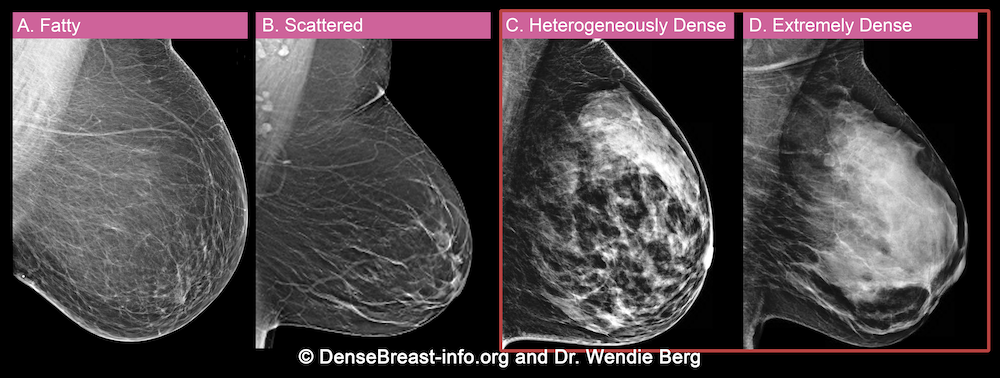Breast density is a measure of how much fibrous and glandular tissue is in your breast, compared to fatty tissue. Your breast tissue may be called ‘dense’ if you have more fibrous and glandular tissue (also known as fibroglandular tissue), compared to fatty tissue in the breast. About half of all women have dense breasts. Having dense breasts is not abnormal.
However, women who have dense breasts have a slightly higher risk of breast cancer. Dense breast tissue can also make it harder for the doctor interpreting your mammogram (radiologist) to see cancers because the dense tissue may obscure suspicious findings. This is because dense tissue appears white on a mammogram, which can hide many types of suspicious findings that also appear white.
How do I know if I have dense breasts?
Radiologists are doctors who “read” mammograms (and other types of imaging tests). They check your mammogram for abnormal areas, and they also look at breast density.
There are 4 categories of breast density. They go from almost all fatty tissue to extremely dense tissue with very little fat. The radiologist looks at your mammograms to determine which of the 4 categories best describes how dense your breasts are:
 Source: https://densebreast-info.org/
Source: https://densebreast-info.org/
In general, patients whose breast density falls into categories C (heterogeneously dense) or D (extremely dense) are considered to have dense breast tissue. This includes about half of all women in the US who have mammograms to look for breast cancer.
Mammogram reports sent to healthcare providers typically include a detailed description of breast density. Mammogram results sent directly to patients will inform you of your breast density in lay terms. If your results indicate you have dense breasts, please discuss your options with your healthcare provider.
Should I have any other screening tests if I have dense breast tissue?
At this time, experts do not agree what other tests, if any, should be done in addition to mammograms in women with dense breasts.
Studies have shown that breast ultrasound and possibly magnetic resonance imaging (MRI) can also help find some breast cancers that can’t be seen on mammograms. You should discuss your options with your healthcare provider. The cost of an ultrasound or MRI may be subject to deductible, copay, coinsurance charges.
What should I do if I have dense breast tissue?
If your mammogram report says that you have dense breast tissue, talk with your healthcare provider about what this means for you. Be sure that your doctor or nurse knows if there’s anything in your medical history that increases your risk for breast cancer.
More Information
- https://densebreast-info.org/
- https://www.acr.org/Practice-Management-Quality-Informatics/Practice-Toolkit/Patient-Resources/Mammography-Saves-Lives/Breast-Density-and-You
- Download a patient brochure on breast density from ACR:
- https://www.cancer.org/cancer/types/breast-cancer/screening-tests-and-early-detection/mammograms/breast-density-and-your-mammogram-report.html
© 2002-2026 South Texas Radiology Imaging Centers
Material contained within this website is for informational purposes only and is not intended as professional medical advice, diagnosis or treatment.
